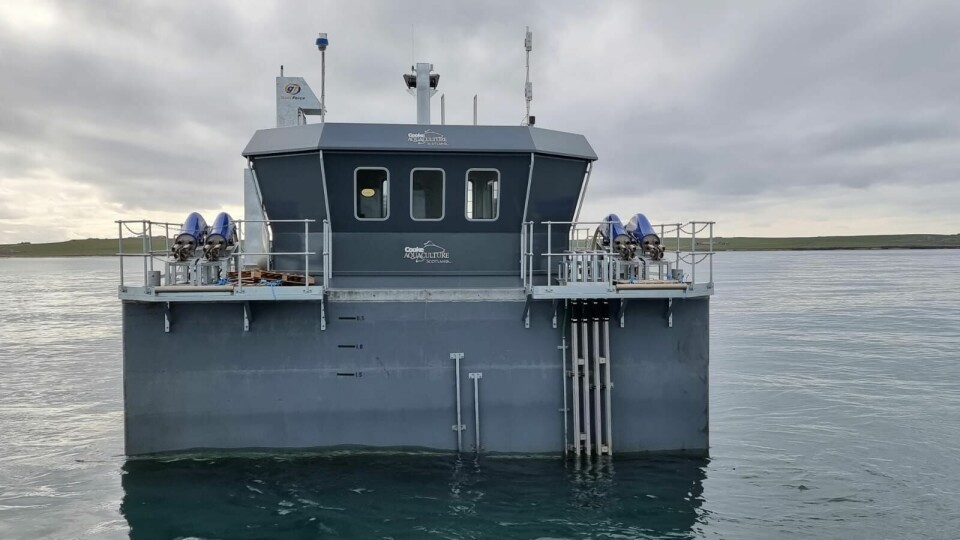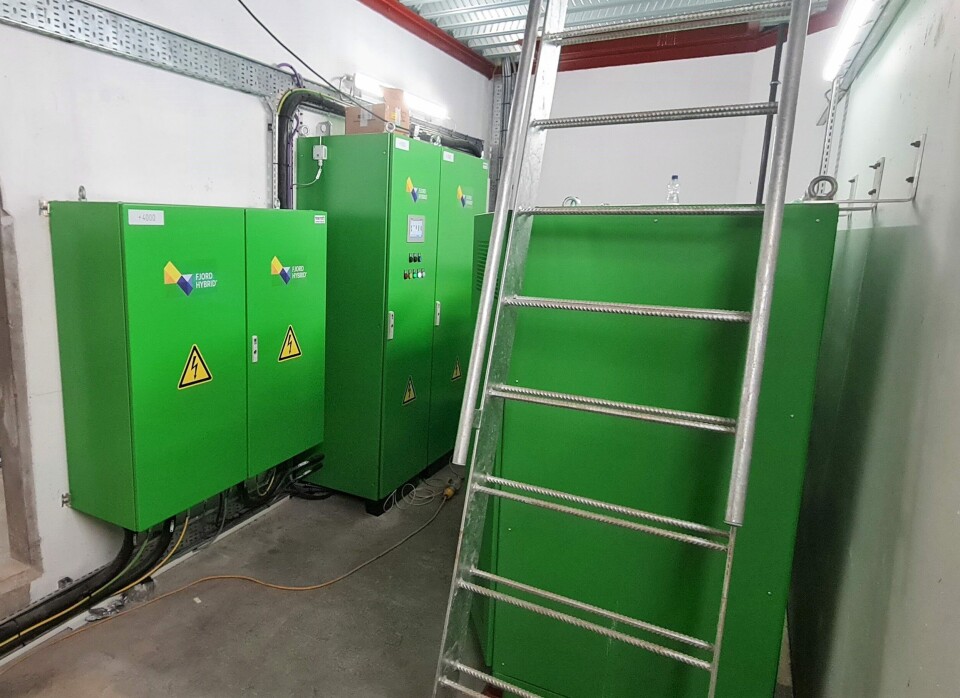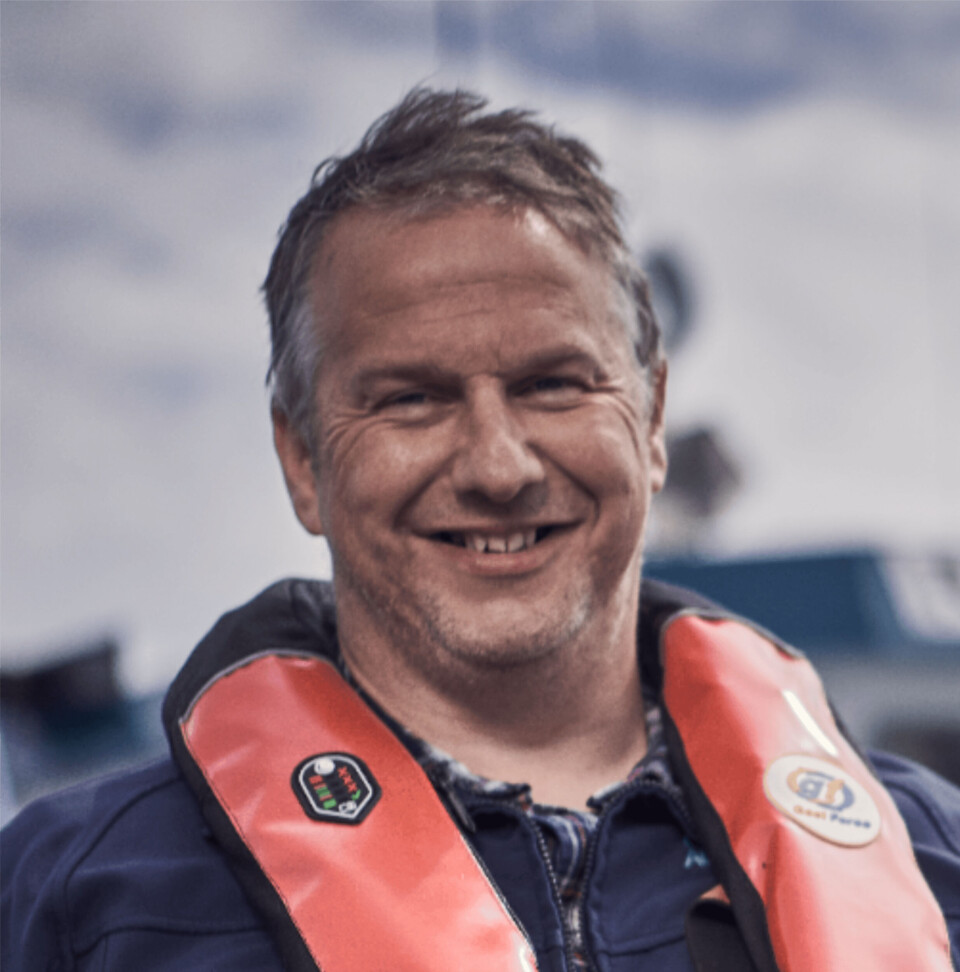
Gael Force delivers Cooke Scotland’s first hybrid power feed barge
Cooke Aquaculture Scotland has taken delivery of its first hybrid power feed barge, at its Mill Bay organic site in Stronsay, Orkney.
The 200-tonne-capacity SeaMate barge was built by Inverness-based Gael Force Group in partnership with Norwegian company Fjord Maritime, which developed the hybrid technology.
Under the system, an auxiliary diesel generator will only operate to recharge batteries on the barge which are then used to power the barge and the electrical demand of the seawater site.

60% less fuel use
Cooke has calculated that the hybrid system will significantly cut carbon emissions. In 2019 the salmon farmer initiated a review of barge power as part of an exploration of alternative sources of power supply to its seawater sites in Orkney and Shetland. The identified hybrid battery solution automates power supply and optimises use of generators, batteries, electrical drives and control systems. Modelling shows that this will reduce generator run time by up to 90% and fuel consumption by up to 60%.
The barge is expected to achieve carbon savings of approximately 146 tonnes of CO₂ ever year, equivalent to removing 55 cars from the roads.
As well as the vessel being the first hybrid barge Cooke has deployed in the UK, it is also the first time Fjord Maritime’s technology has been deployed outside Norway, and the first fully hybrid barge the Gael Force has delivered in the UK.
The hybrid technology developed by Fjord Maritime has been deployed on more than 100 barges in Norway in recent years, so is tried and tested, Cooke said in a press release.

Environmental sense
Cooke’s North Isles manager, Stewart Rendall, said: “Farm-raised salmon already have one of the lowest carbon footprints but there is always more we can do to minimise any impact on the environment and play our part in tackling climate change.
“This is a significant investment but one that makes economic and environmental sense. Our new hybrid feed barge in Orkney has been developed by partners with a strong track record and we have a high degree of confidence in the expected performance of our new hybrid barge.
“We are already exploring options to deploy this technology on other barges across our fleet in Orkney and Shetland which would further lighten our carbon footprint.”
Retrofitting
Gael Force sales director Jamie Young said that as well as giving the company the capability to fully hybridise power across its range of concrete and steel feed barges, both on new builds and retrospectively, Fjord Hybrid complemented the barge’s SeaFeed system, designed to reduce feed waste and save on energy.
“We are delighted that the team at Cooke Aquaculture have placed their confidence in us as an experienced barge builder in Scotland, to help them in achieving steps towards further carbon footprint reduction,” added Young. “We believe this will be the start of a programme of retrofitting these hybrid systems to existing barges in Scotland and will become the norm in fitting out our new barge builds.”
Øyvind Bakke, chief commercial officer at Fjord Maritime, said that by cutting running time for generators, its system reduces service and maintenance costs, as well as reducing noise for workers on the barge and any neighbours.
Remote operation
“The Fjord Hybrid solution will be operated remotely through Fjord Maritime’s Fjord Control system,” explained Bakke.
“The solution continually transmits information about status and any unexpected events, meaning any necessary corrections can be performed remotely and in real time, thereby securing maximal uptime. You can also use the data collected to optimise energy consumption. This leads to further reduced operation costs in the production of fish.”
Cooke is the third salmon farmer in Scotland to take delivery of a hybrid feed barge. Loch Duart and Scottish Sea Farms each have a Polish-built hybrid barge supplied by Norwegian company ScaleAQ.






















































